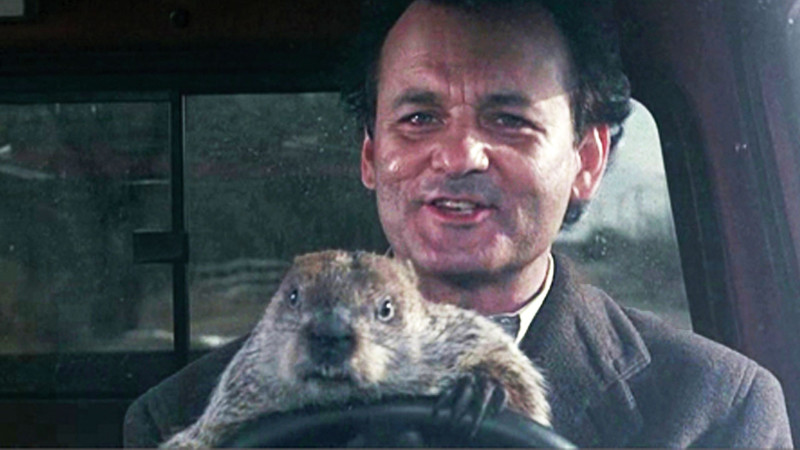
These are my mediation lecture notes from February 2nd.
Today is Groundhog Day. This is actually a holdover from the old Celtic holiday of Imbolc — some of you might know it as Candlemas at your church. It’s halfway (give or take a few days) between the Winter Solstice and the Spring Equinox. The days are starting to get longer, you can see buds starting to swell up on some trees. In one way of figuring the seasons, this is the beginning of spring, while in another it’s the middle of winter — this is probably the root of the story about the groundhog deciding if we get another month and a half of winter.
But today I want to talk about the movie Groundhog Day. It’s a comedy from the 90s, where Bill Murray’s character, Phil Connors, gets stuck in a time loop while covering the Groundhog Day festivities in Punxsutawney. He lives the same day over and over and over again. Whatever he does doesn’t matter, he wakes up the next day and the whole world is reset.
And so at first he thinks, “Hey, great, I’ll do whatever I want! Party time! Eat, drink, and be merry!” But this gets boring pretty quickly. It’s not satisfying at all. So he gets depressed. He even tries to kill himself, but that doesn’t matter either, the world resets and he wakes up again the next day in the same bed with the same song on the radio.
Then he realizes, well, I have all this time. I’m stuck here. I might as well use it to improve myself. He starts taking lessons in playing the piano and sculpting ice and speaking French. (It’s kind of funny, because how would that work? The teachers don’t remember him from lesson to lesson. The movie skips over that.)
And as he does this, he’s getting to know the people around him. He seems them every day, after all, and learns about their situation, comes to understand them. And he starts seeing the suffering and trouble around him. He knows that this woman is going to get a flat tire at this time, this boy is going to fall out of a tree at that time. So he decides to start helping them. He’s there to help change the tire, to catch the falling boy.
There’s also one person who dies, and the saddest and most poignant scene is when Phil realizes he can’t fix that. He has to come to terms with death, too.
Now because the movie is a romantic comedy, he falls in love and that’s what eventually breaks the spell. But I think what’s important is what he does in the time before that — all those loops through, maybe it’s years, maybe thousands of years! People have different theories. But through all that time, Phil first tries to lose himself in partying, in simple pleasure. And it doesn’t work. And he tries giving in to despair. But that obviously doesn’t work.
So he does three things: he works to improve himself. He comes to love the people around him. And he uses the skills he learns to help make life better for the those other people, he becomes their guardian and protector and helper.
And that’s really what we should be doing as karateka, isn’t it? We’re here to work on ourselves, to make ourselves better and stronger individuals. But if we’re doing karate-do, the Way of Karate, we’re also improving our heart. We learn that getting stronger and more skilled is useless unless we use it to help others. That’s what Kaicho Nakamura means by “Love, Respect, and Obedience”, the principles of Seido Karate. (“Obedience” here is meant in the sense of being obedient to someone’s needs, to putting others first. It is little bit of a tricky translation from Japanese.)
It’s also a lot like one of Kaicho’s favorite movies, Ikuru. That’s an Akira Kurosawa movie about a man who learns he has cancer and not long to live. So like Phil in Groundhog Day, he tries partying to forget, but it doesn’t work. He tries to find satisfaction is his family relationships — this is more of a Japanese idea — but that doesn’t work either. It’s when he devotes himself to helping others, in this case helping get a park built (not as dramatic as Groundhog Day), that he finds satisfaction.
In Groundhog Day, the hero has a very long time to deal with, in Ikiru he has a short time. And the movies have very different tones and come out of different cultures. But they both ask the question, what are you going to do with your time?
Still from Groundhog Day, via Breck Film Fest. Fair use.